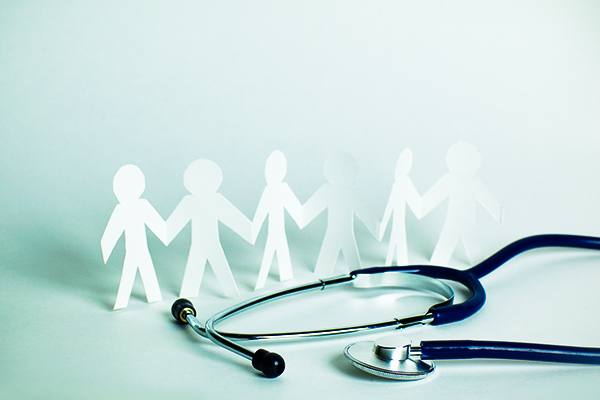Burnout: What Is It and What Can We Do About It?
Breeanna Messner, MSIII - Washington State University Elson S Floyd College of Medicine
EMRA MSC West Coordinator, 2022-2023
Kit Sitterley, OMSIV - Burrell College of Osteopathic Medicine
EMRA MSC Southwest Regional Representative, 2022-2023
Nicholas Rodriguez, MSIII - Kaiser Permanente Bernard J Tyson School of Medicine
EMRA MSC Pacific Regional Representative 2022-2023
In addition to the COVID-19 pandemic, there is another kind of pandemic spreading throughout medicine in the United States: burnout. It comes in many different forms and the statistics show that you are probably burned out yourself. While the definition of burnout varies, the National Library of Medicine would define burnout as, “a psychological syndrome featuring emotional exhaustion, depersonalization, and a reduced sense of personal accomplishment.” (1) Not only do ⅓ of physicians experience burnout at any time (2), but up to 46% of physicians become burned out during their career. The causes of burnout are endless. In Emergency Medicine, emotional injury, skyrocketing litigation rates, chronic fatigue and dissatisfaction with the EHR system are some of the more common causes (3). It can manifest as unhealthy alcohol or drug use, troubled relationships with loved ones and even suicide (3). However, at its core it is physical and emotional exhaustion and a feeling of lower personal accomplishment from chronic exposure to stress in the ED.
There are numerous ways burnout can manifest. For some, it may result in poor sleep, changes in eating patterns, or feelings of overwhelming emotions. One may experience feelings of social isolation, justifying it by throwing oneself into study and work while ignoring personal or social needs (4). One may even experience dreadful anticipation of burnout, for example before starting a notoriously difficult rotation or when starting a Step 1 dedicated study period. For friends, peers, and mentors, recognizing these signs in others can be especially important if the individual is not able to recognize these signs in themselves.
Healthcare professionals and students can turn to burnout inventories to identify the complex, multifactorial components of burnout. The Maslach Burnout Inventory has been developed to identify burnout in specific populations, with scales existing for both students and for medical personnel. For medical personnel the tool addresses three scales of burnout: emotional exhaustion, depersonalization, and personal accomplishment. For some, burnout may even present as depression, with those affected displaying symptoms in line with measures like the PHQ-9 (5). Whether it is for oneself or for colleagues, having familiarity with inventories like these can help to better identify those in need of extra support or resources.
If you notice yourself feeling burnt out, here are things you can try to help get yourself out of this state:
- Catch some Z’s. While 8 hours of sleep may not always be possible, especially during training, aim to get as close as possible. Not only can this help if you are feeling burnt out, this can also help prevent burnout (6).
- Consider asking for help. Most schools have resources to provide to their students. Whether that be counseling services or maybe other services aimed at helping students experiencing burnout.
- Move your body or find your zen! Try to include exercising, yoga, and meditation into your routine. This may all help decrease stress and perceived stress (7,8).
- Avoid over-committing yourself. It can be easy to sign up for every extracurricular you hear of, but take a second before signing up to see if it’s something you have the bandwidth for. If it’s something you really want to do, but you have already overbooked your schedule, consider taking a step back from something else.
- Burnout is a real thing; know that you're not alone. Consider joining the EMRA Wellness Committee or your school’s wellness committee to talk about ways to support general health and wellness and connect with fellow students. If your school doesn't have a wellness committee, consider starting one at your school!
*If you or someone you know is having thoughts of suicide, the 24/7 National Suicide Prevention Lifeline can help by calling its new lifeline number 988.
References
- Stehman, C. R., Testo, Z., Gershaw, R. S., & Kellogg, A. R. (2019). Burnout, Drop Out, Suicide: Physician Loss in Emergency Medicine, Part I. The western journal of emergency medicine, 20(3), 485–494.
- Drummond, D. (2015). Physician Burnout: Its Origin, Symptoms, and Five Main Causes. Family Practice Management, 22(5), 42-47.
- De Hert S. (2020). Burnout in Healthcare Workers: Prevalence, Impact and Preventative Strategies. Local and regional anesthesia, 13, 171–183.
- Krisberg K. Medical School Burnout: Reaching Out to Students at Risk. AAMC News. Published September 27, 2018.
- Ranasinghe, P.D., Owusu, J.T., Bertram, A. et al. Depressive Symptoms and Burnout Among Medical Students: a Prospective Study. J GEN INTERN MED 37, 64–69 (2022).
- Stewart, N. H., & Arora, V. M. (2019). The Impact of Sleep and Circadian Disorders on Physician Burnout. Chest, 156(5), 1022–1030.
- Bretland, R. J., & Thorsteinsson, E. B. (2015). Reducing workplace burnout: the relative benefits of cardiovascular and resistance exercise. PeerJ, 3, e891.
- Cocchiara, R. A., Peruzzo, M., Mannocci, A., Ottolenghi, L., Villari, P., Polimeni, A., Guerra, F., & La Torre, G. (2019). The Use of Yoga to Manage Stress and Burnout in Healthcare Workers: A Systematic Review. Journal of clinical medicine, 8(3), 284.
Related Content

Aug 17, 2022
Burnout: What Is It and What Can We Do About It?
In addition to the COVID-19 pandemic, there is another kind of pandemic spreading throughout medicine in the United States: burnout. It comes in many different forms and the statistics show that you are probably burned out yourself. While the definition of burnout varies, the National Library of Medicine would define burnout as, “a psychological syndrome featuring emotional exhaustion, depersonalization, and a reduced sense of personal accomplishment.”





